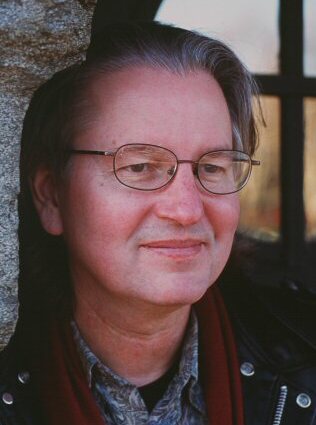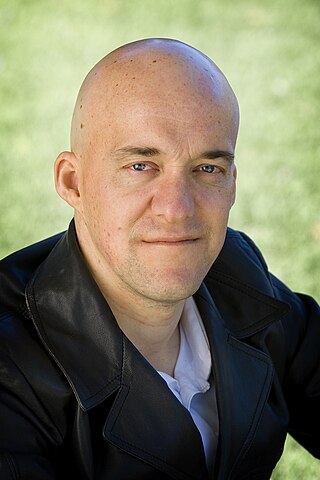
Michael Bruce Sterling is an American science fiction author known for his novels and short fiction and editorship of the Mirrorshades anthology. In particular, he is linked to the cyberpunk subgenre.

An environmentalist is a person who is concerned with and/or advocates for the protection of the environment. An environmentalist can be considered a supporter of the goals of the environmental movement, "a political and ethical movement that seeks to improve and protect the quality of the natural environment through changes to environmentally harmful human activities". An environmentalist is engaged in or believes in the philosophy of environmentalism or one of the related philosophies.

Nature conservation is the moral philosophy and conservation movement focused on protecting species from extinction, maintaining and restoring habitats, enhancing ecosystem services, and protecting biological diversity. A range of values underlie conservation, which can be guided by biocentrism, anthropocentrism, ecocentrism, and sentientism, environmental ideologies that inform ecocultural practices and identities. There has recently been a movement towards evidence-based conservation which calls for greater use of scientific evidence to improve the effectiveness of conservation efforts. As of 2018 15% of land and 7.3% of the oceans were protected. Many environmentalists set a target of protecting 30% of land and marine territory by 2030. In 2021, 16.64% of land and 7.9% of the oceans were protected. The 2022 IPCC report on climate impacts and adaptation, underlines the need to conserve 30% to 50% of the Earth's land, freshwater and ocean areas – echoing the 30% goal of the U.N.'s Convention on Biodiversity.
The Viridian Design Movement was an aesthetic movement focused on concepts from bright green environmentalism. The name was chosen to refer to a shade of green that does not quite look natural, indicating that the movement was about innovative design and technology, in contrast with the "leaf green" of traditional environmentalism. The movement tied together environmental design, techno-progressivism, and global citizenship. It was founded in 1998 by Bruce Sterling, a postcyberpunk science fiction author. Sterling always remained the central figure in the movement, with Alex Steffen perhaps the next best-known. Steffen, Jamais Cascio, and Jon Lebkowsky, along with some other frequent contributors to Sterling's Viridian notes, formed the Worldchanging blog. Sterling wrote the introduction to Worldchanging's book, which is considered the definitive volume on bright green thinking. Sterling formally closed the Viridian movement in 2008, saying there was no need to continue its work now that bright green environmentalism had emerged.
Sustainable living describes a lifestyle that attempts to reduce the use of Earth's natural resources by an individual or society. Its practitioners often attempt to reduce their ecological footprint by altering their home designs and methods of transportation, energy consumption and diet. Its proponents aim to conduct their lives in ways that are consistent with sustainability, naturally balanced, and respectful of humanity's symbiotic relationship with the Earth's natural ecology. The practice and general philosophy of ecological living closely follows the overall principles of sustainable development.
The phrase sustainable industries is related to the development of industrial processes in a sustainable way. The phrase refers to greening of energy intensive industries such as the textiles, steel, cement, and paper industries.
The following outline is provided as an overview and topical guide to green politics:

Water conservation aims to sustainably manage the natural resource of fresh water, protect the hydrosphere, and meet current and future human demand. Water conservation makes it possible to avoid water scarcity. It covers all the policies, strategies and activities to reach these aims. Population, household size and growth and affluence all affect how much water is used.

Energy conservation is the effort to reduce wasteful energy consumption by using fewer energy services. This can be done by using energy more effectively or changing one's behavior to use less service. Energy conservation can be achieved through efficient energy use, which has some advantages, including a reduction in greenhouse gas emissions and a smaller carbon footprint, as well as cost, water, and energy savings.

In 1976, energy policy analyst Amory Lovins coined the term soft energy path to describe an alternative future where energy efficiency and appropriate renewable energy sources steadily replace a centralized energy system based on fossil and nuclear fuels.
Techno-progressivism, or tech-progressivism, is a stance of active support for the convergence of technological change and social change. Techno-progressives argue that technological developments can be profoundly empowering and emancipatory when they are regulated by legitimate democratic and accountable authorities to ensure that their costs, risks and benefits are all fairly shared by the actual stakeholders to those developments. One of the first mentions of techno-progressivism appeared within extropian jargon in 1999 as the removal of "all political, cultural, biological, and psychological limits to self-actualization and self-realization".
Technogaianism is a bright green environmentalist stance of active support for the research, development and use of emerging and future technologies to help restore Earth's environment. Technogaianists argue that developing safe, clean, alternative technology should be an important goal of environmentalists and environmentalism.

Environmentalism or environmental rights is a broad philosophy, ideology, and social movement about supporting life, habitats, and surroundings. While environmentalism focuses more on the environmental and nature-related aspects of green ideology and politics, ecologism combines the ideology of social ecology and environmentalism. Ecologism is more commonly used in continental European languages, while environmentalism is more commonly used in English but the words have slightly different connotations.

Frugality is the quality of being frugal, sparing, thrifty, prudent, or economical in the consumption of resources such as food, time or money, and avoiding waste, lavishness or extravagance.

Negawatt power is investment to reduce electricity consumption rather than investing to increase supply capacity. In this way, investing in negawatts can be considered as an alternative to a new power station and the costs and environmental concerns can be compared.
Green marketing is the marketing of products that are presumed to be environmentally safe. It incorporates a broad range of activities, including product modification, changes to the production process, sustainable packaging, as well as modifying advertising. Yet defining green marketing is not a simple task. Other similar terms used are environmental marketing and ecological marketing.
Bright green environmentalism is an environmental philosophy and movement that emphasizes the use of advanced technology, social innovation, eco-innovation, and sustainable design to address environmental challenges. This approach contrasts with more traditional forms of environmentalism that may advocate for reduced consumption or a return to simpler lifestyles.
Conservation psychology is the scientific study of the reciprocal relationships between humans and the rest of nature, with a particular focus on how to encourage conservation of the natural world. Rather than a specialty area within psychology itself, it is a growing field for scientists, researchers, and practitioners of all disciplines to come together and better understand the Earth and what can be done to preserve it. This network seeks to understand why humans hurt or help the environment and what can be done to change such behavior. The term "conservation psychology" refers to any fields of psychology that have understandable knowledge about the environment and the effects humans have on the natural world. Conservation psychologists use their abilities in "greening" psychology and make society ecologically sustainable. The science of conservation psychology is oriented toward environmental sustainability, which includes concerns like the conservation of resources, conservation of ecosystems, and quality of life issues for humans and other species.

Barry William Brook is an Australian scientist. He is an ARC Australian Laureate Professor and Chair of Environmental Sustainability at the University of Tasmania in the Faculty of Science, Engineering & Technology. He was formerly an ARC Future Fellow in the School of Earth and Environmental Sciences at the University of Adelaide, Australia, where he held the Sir Hubert Wilkins Chair of Climate Change from 2007 to 2014. He was also Director of Climate Science at the Environment Institute.
The following outline is provided as an overview of and topical guide to environmentalism:









